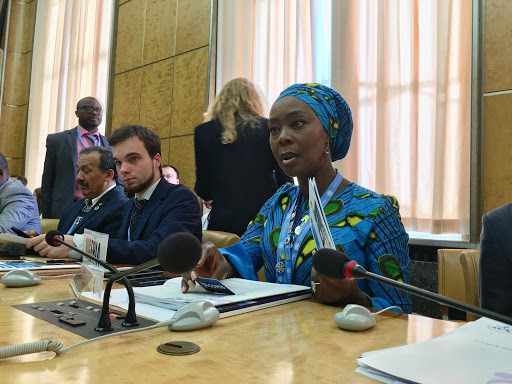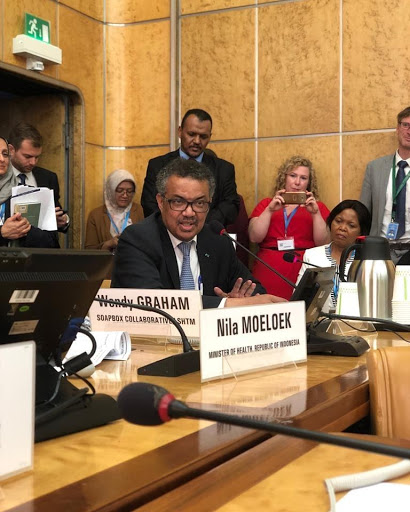Categories
Her Excellency Toyin Ojora Saraki, Founder-President of the Wellbeing Foundation Africa, addressed the World Health Assembly yesterday on ‘Why water, sanitation and hygiene must be a priority for quality healthcare.’
The high-level intervention came at a symposium organised by the Governments of Zambia, Tanzania, Sweden, Japan, Germany and Eswatini; the World Health Organization and WaterAid.
Mrs Saraki expanded on the campaign she launched last year to dramatically improve water, sanitation and hygiene (WASH) conditions in healthcare facilities in Nigeria and around the world, calling for a whole-system approach to tackling systemic failures.

Following her intervention, Mrs Saraki commented:
“I was honoured to speak to the representatives of Governments from around the world and global institutions at the World Health Assembly to advocate for a transformation of WASH standards.”
“According to UNICEF, 7,000 newborn babies died every day in 2017, mostly from preventable and treatable conditions including infections like sepsis, directly linked to poor WASH conditions. One in four health care facilities around the world lacks basic water services, impacting over 2 billion people.”
“Last year I called on all Governments to adopt the WHO’s resolutions on WASH and sepsis, and I agree with Dr Tedros’ warning that we must “go back to basics” – medicine has achieved so much, yet without universal access to safe water, sanitation and hygiene we will never achieve universal health coverage.”
“Hand hygiene must be a quality indicator in every facility and a national marker of health care quality, with access to soap and water monitored and assessed.”
“WASH conditions in healthcare facilities are our first line of defence as infection prevention and control. Dangerous conditions put not only patients in danger, but also workers on the frontlines of healthcare.”
“In Nigeria, the WHO found that 29% of healthcare facilities do not have access to safe water and toilets, whilst a WaterAid survey revealed that half of primary health facilities do not have handwashing facilities in delivery rooms. Pregnant women and newborns are thereby placed in huge danger and at risk of sepsis, which is a leading cause of death in hospitals. As the Founder-President of the WBFA, I work with our midwives through our frontline healthcare programmes to ensure that mother and baby are safe from birth through to age. Without adequate WASH facilities, however, midwives all over the world are unable to safely carry out their crucial work – and to lead the way with quality care.”

World Health Assembly delegates were also addressed by Dr Tedros Adhanom Ghebreyesus, Director-General of the World Health Organization; Hon. Senator Lizzie Nkhosi, Minister of Health, Eswatini; Professor Dr. Nila Faustine Ndugulile, Deputy Minister of Health, United Republic of Tanzania; Dr Abel Kabalo, Director, Ministry of Health, Zambia; Dr Naoko Yamamoto, WHO Assistant Director General of Antimicrobial Resistance at the World Health Organization; Professor Wendy Graham, Chief Scientific Adviser, Soapbox Collaborative and Professor at the London School of Hygiene and Tropical Medicine; Kaveri Mayra, a midwife representing the International Confederation of Midwives; Lucy Singh from the University of Aberdeen; Dr Maria Neira, WHO Director, Department of Public Health, Environmental and Social Determinants of Health; Tim Wainwright, Chief Executive, WaterAid UK, Dr Kirana Pritasari, Director of the Ministry of Health of Indonesia; and Anders Tegnell from Public Health Sweden.
Categories